Coordinación
Una coordinación sólida puede evitar vacíos y duplicaciones en las respuestas humanitarias, así como garantizar que los PTM complementen otros tipos de asistencia. Sin embargo, el informe del «Estado Global de los Programas de Transferencias Monetarias» de la CALP Network muestra que la coordinación de la asistencia en efectivo es vista como débil y ad hoc, y que esto está teniendo graves repercusiones operativas.
Los donantes, las ONG y los líderes de los grupos de trabajo de transferencias monetarias (GTM) han pedido claridad sobre tres temas principales relacionados con la coordinación de la asistencia en efectivo:
- Quién debe ser responsable de asegurar una coordinación eficaz de la asistencia en efectivo;
- Cuál es la función y el mandato de los grupos de trabajo de transferencias monetarias, incluso en relación con las transferencias monetarias multipropósito;
- Cómo se debe dotar de recursos a la coordinación de asistencia en efectivo.
Tenemos que basarnos urgentemente en lo que funciona y proporcionar claridad a nivel mundial sobre las preguntas arriba mencionadas, adaptándonos a los diferentes contextos. Hace mucho tiempo que se deberían haber tomado decisiones claras basadas en necesidades operativas y no en la política de las agencias.
Prioridades actuales
El objetivo de la CALP Network es contribuir a seguir progresando en este tema en tres niveles: apoyar a los grupos de trabajo de transferencias monetarias a nivel regional; contribuir a soluciones prácticas para la coordinación de la asistencia en efectivo a nivel mundial; y convocar una discusión basada en la evidencia sobre temas clave, destacando puntos de decisión críticos y oportunidades de progreso.
Contenido destacado

Cash Coordination Tip Sheet
Guidelines and Tools
This tip sheet sets out established best practice, key guidance and resources for all aspects of cash coordination, intended as a clear, accessible and action-oriented guide for those engaged in coordination of cash and voucher assistance (CVA) at the field level.

Introducing the Cash Coordination Tip Sheet
Webinar
The CALP Network has developed a tipsheet setting out established best practice and key guidance and resources for all aspects of cash coordination, intended as a clear, accessible and action-oriented guide for those engaged in coordination of cash and voucher assistance at the field level.

Cash Coordination: A proposal from members in MENA
Blog Post
Earlier this year the CALP Network undertook regional consultations to explore options for cash coordination. This blog lays out recommendations from participants from the Middle East and North Africa who sketched out what cash coordination, and coordination more broadly, could look like in future to support a more effective, efficient and accountable response.
Últimos recursos

Revisado Análisis del Mercado Previo a la Crisis (PCMA)
Guía y herramientas
Este documento proporciona las directrices para que los profesionales lleven a cabo el análisis de mercado antes del inicio de una crisis prevista utilizando una adaptación de las herramientas existentes para la evaluación del mercardo después de la crisis. Las recomendaciones que se derivan de...

What to know: working with humanitarians on e-cash programs
Report
International humanitarian assistance rose to a record US$24.5 billion in 2014. The 2015 Global Humanitarian Assistance Report indicated that over US$200 million of this was used in cash and voucher programs. An increasing number of humanitarian actors have begun to deliver cash electronically, through...
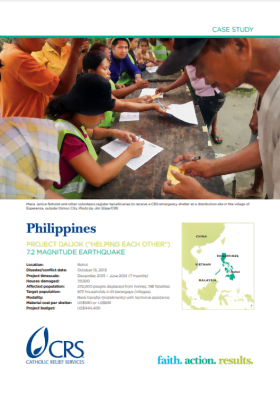
Using Cash for Shelter: Project Daijok ("Helping Each Other")
Case Study
After a major earthquake in the Philippines in October 2013, Catholic Relief Services reached 5,000 families with emergency shelter materials, water and hygiene kits, and emergency latrines. In November 2013, CRS staff conducted a housing and market assessment in three of the worst‑hit municipalities of...
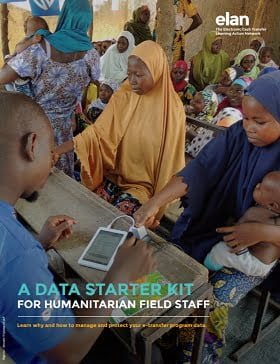
Data Starter Kit for Humanitarian Field Staff
Guidelines and Tools
A practical guide to help humanitarian field staff understand and manage data protection issues.
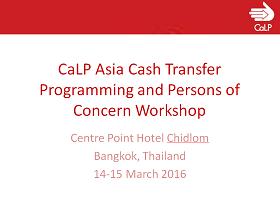
The CALP Network Module 2 – CTP Fundamentals
Report
Cash transfer programming is one form of humanitarian response, which can be used to meet basic needs and/or protect, establish or re-establish livelihoods.
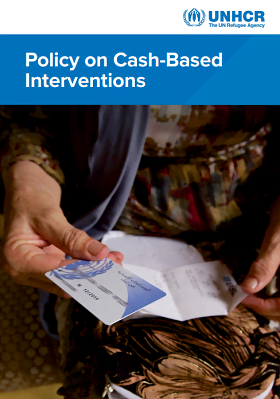
Policy on Cash-Based Interventions
Report
UNHCR’s Policy on Cash-Based Interventions (CBIs) is introduced herewith to expand and systematise the use of CBIs as a modality of assistance and service delivery across the organization and its operations worldwide. The Policy reconfirms UNHCR’s commitment to the increased use of CBIs and sets out...

Economic Impacts of Humanitarian Aid
Report
Humanitarian aid – whether in-kind or cash transfers – can have a significant economic impact. Potential positive effects include stimulating demand, supporting regeneration of local businesses, job creation and increased tax revenue for governments. Potential negative effects include price inflation,...

When the Money Runs Out Do Cash Transfers Have Sustained Effects on Human Capital Accumulation
Report
This study examines the medium-term effects of a two year cash transfer program targeted to adolescent girls and young women. Significant declines in HIV prevalence, teen pregnancy, and early marriage among recipients of unconditional cash transfers (UCTs) during the program evaporated quickly two...

Cash-based programming to address hunger in conflict-affected South Sudan: A case study
Report
For some time aid agencies and donors have recognised the benefits of utilising markets to deliver food assistance. And for almost as long, cash-based programming has been effective in doing this by improving people’s ability to purchase sufficient nutritious food. Addressing hunger through cash...

Impact Evaluation of the Multipurpose Cash Assistance Programme
Report
The Syrian crisis is currently in its sixth year, with over one million Syrians still living in Lebanon as refugees. Nearly 60% of all financial resources pledged by UN agencies and INGOs were to secure basic assistance for Syrian refugees, mainly to support them in meeting food and healthcare needs. In...

How can lump-sum cash transfers be designed to improve their productive potential?
Presentation
Cash transfer programmes are one of the most popular welfare policies in the developing world and are also backed by a large and rigorous evidence base. Besides the effects on consumption and human capital, the productive impact of cash transfers has been increasingly scrutinised. Despite the fact that...

Food Security Cluster Coordinator Cash Transfer Briefing Package
Report
The gFSC aims to contribute actively to provide guidance and tools for national food security clusters to adequately coordinate cash interventions among cluster/sector partners and to ensure equally and consistently consideration of cash alongside other forms of humanitarian assistance in the food...

UNHCR Cash Assistance: Improving refugees lives and supporting local economies
Report
UNHCR’s Cash-Based Interventions (CBI) support the most vulnerable Syrian refugees living within the host community in Jordan. Thanks to generous donor support last year, over 30,000 households received monthly cash assistance, winterisation cash, and cash for health, totalling nearly US $ 85 million....
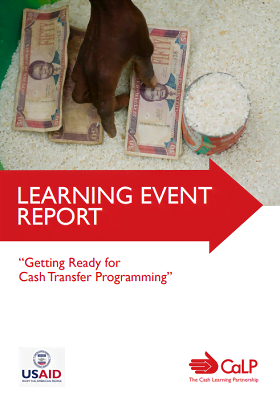
Learning Event Report " Getting ready for cash transfer programming"
Report
Despite the rapid, dynamic evolution of cash transfer implementation in West Africa, actors’ lack of preparation means that the tool cannot fulfil its potential. As a result, the scope of interventions remains limited, the combination of different methods is not often envisaged, the most...

Pre-Crisis Market Analysis: Credit, Drinking Water and Wheat Flour Market Systems
Report
Mosul, Iraq’s second largest city, was captured by ISIS in June 2014 and remains under their control. The Iraqi army has vowed to recapture Mosul and the speculation is that a counter-offensive is imminent – a military operation which could have dramatic humanitarian implications. A large influx of...

Can E-transfers Promote Financial Inclusion in Emergencies: A Case Study from Bangladesh
Report
The Electronic Cash Transfer Learning Action Network (ELAN) launched research to build an evidence base around connecting emergency electronic transfer (e-transfer) recipients with additional financial services. They wanted to learn if, when, and how e-transfers can promote sustained uptake and use...

The Politics of Cash: A Case Study on Humanitarian Cash Transfers in Ukraine
Report
This case study examines the evolution of cash transfers in the humanitarian response in Ukraine. The use of cash transfers in Ukraine brought out the best and worst aspects of the international humanitarian system. Uncertainty over where cash fits into the humanitarian architecture – and whether...
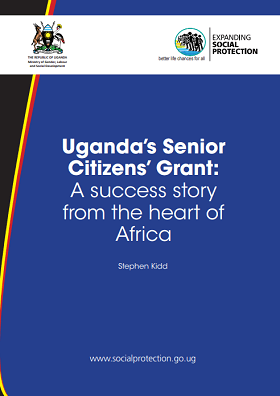
Uganda’s Senior Citizens’ Grant: A success story from the heart of Africa
Report
Since 2011, a pilot universal old age pension – known as the Senior Citizens’ Grant (SCG) – has been implemented in Uganda. By 2016, there were 125,000 beneficiaries. A number of studies have demonstrated that the scheme has had significant benefits. Despite the general economic situation worsening...
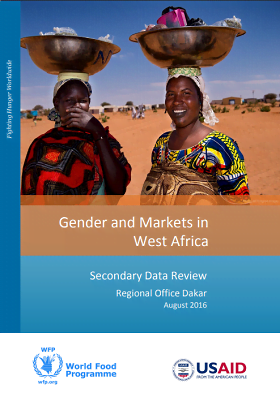
Gender and Markets in West Africa – Secondary Data Review
Report
The secondary information and data review presented here covers all gender and markets assessments conducted by WFP in West Africa, and market assessments conducted by key partners in the region over the past 5 years. The quality of the compiled assessments is reviewed to identify data and information...

Literature review on the Use of Cash in Shelter
Report
The Global Shelter Cluster (GSC) with support from UNHCR conducted this literature review of the use of cash in shelter programming to help assess how much documented evidence was currently available from within the sector. The objective of this study is to help better prepare the GSC and its members to...